#// because if left unchecked I can and will write a novel titled The Adventures of Gallagher and Micah
Explore tagged Tumblr posts
Text
The Art of Remembering
@omnipicureans: OPIA ( . . . ) the ambiguous intensity of looking someone in the eye, which can feel simultaneously invasive & vulnerable. Obscure Feelings prompts | no longer accepting
« After that, Gallagher used the Enigmata's power to once again activate this soaring Dreamscape unfettered by The Family's shackles — this is the origin of Dreamflux Reef. »
”Do you see it yet?”
”Bring her down.”
With a roar of the engines, the ship rocked violently. A shrill, out-of-sync cacophony of alarms filled the cockpit in a flurry of red and white flashing lights. Micah had been a pilot for years by then, once a member of the rebellion’s combat fleet, now the newly-crowned heir to the Watchmaker’s name, but no amount of experience could save you in a contest of raw strength. He wrestled the wheel, the points of every knuckle pressed up against the leather of his gloves in sharp ridges, the soft lines of age between his eyebrows darkened into deep furrows of concentration. The stabilizer blinked rapidly just off to his right. His eyes darted to it, but the wheel jerked out from his loosened grip the instant he tried to reach for it. He grabbed it again and pulled back hard, the muscle along his jaw tightening until the blue vein that streaked under the pale, nearly translucent skin near his temple raised.
”I hope you’re holding onto something back there,” he said through gritted teeth, and then all at once the ship settled with one long, metallic groan.
An unsteady stillness overcame the cabin, its sirens still blaring in discordance until, one-by-one, the pilot flicked them all off. Then there was only the creak of cooling metal, and the hum of idling engines over yawning memoria.
”I don’t know what that was,” Micah admitted and hesitantly took his hands off the wheel to twist around and check on his passenger, who was just now picking himself up off the steel floor with the help of the leather straps bolted to the wall.
”Are you alright?”
”Where’d you learn to fly,” Gallagher grumbled as he massaged the back of his neck, but the exchange of relieved, albeit uneasy smiles settled the ripples of underlying anxiety. He was a few years younger than Micah, both of them at this point in time pushing into their late thirties, their faces prematurely aged and worn by the demands of war and the hardship of exile. Although one was fair-skinned, blond and blue-eyed, and the other darker in all features, they were, by all appearances, brothers, and the look that passed between them carried a message understood only by those who’d spent decades developing its code together.
So Gallagher gathered himself and went to the door, where he took its handle in both hands and threw his weight down onto it until it turned. Metal screeched against metal as he pushed the door out and then dragged it back along its sliding track, opening to a vast sea of dense, rolling fog that stretched on as far as the eye could see, blending into the dusty navy of a distant sky. Refracted moonlight cast a diffuse, shadowless glow across the gloom. Slipping his hand into his pocket, Gallagher stepped up to the edge and peered down into the sea’s fathomless depths.
”Is this the place?” Micah asked from the cockpit, flipping a switch and turning around again.
”There’s something under the waves, that’s for sure.”
Uncertain silence fell over the cabin for a long time.
”… Are you sure you want to do this?” It was Micah who broke it first, even though his voice barely crested above the steady hum of the engines. He draped his arm around the chair’s headrest and tried to make anything out from the rigid lines of Gallagher’s back.
”I don’t have a choice.” Emphatic. They’d had this conversation a dozen times before, and as if to make a point of that, Gallagher raised his arm out over the sea of fog, then slowly curled his fingers. Wind began to whistle through the cabin, softly at first, but mounting gradually into a gale that whipped the loose ends of Gallagher’s shirt and brushed his hair back from his face. He stared steadily out over the rippling fog, even as the swirling dust and debris forced Micah to shield his eyes behind him. Heat burgeoned after it and the temperature within the ship swelled until its insides shimmered like an oven, skipping sparks of magenta scoring black lines across the floor. Outside, the fog seemed to boil. And boil. And boil, until it spurted geysers of bubbling memoria that rocked the ship as if by a stormy sea.
Gallagher pulled his free hand from his pocket and groped blindly for the strap by the door, but his fingers slipped limply across the worn leather as he doubled over with an anguished gasp. Biting down so hard he felt he might crack his own teeth, he held his right arm steady even as flesh burned away under strips of magenta flame.
”Gallagher!” Micah shot to his feet, but the ship bucked and he fell back. Clamoring for the wheel, he hauled himself over it to hold it steady.
”Gallagher!” He called again, glancing helplessly over his shoulder. “Stop! It’s too mu— ah?!”
His eyes widened and his jaw slacked as the tops of skyscrapers, waterfalls of memoria cascading from the rooftops, emerged beyond the windshield: one - two - three dozen - an entire city in all, risen from the forgotten depths of the primordial dreamscape. They reached for the stars until they eclipsed the moon entirely and plunged the cabin into sleepy darkness. The rumbling stopped soon after, and the ship rocked gently into stillness.
Something heavy hit the floor.
”Gallagher!” Micah scrambled out of the cockpit and rushed to the back, where Gallagher sat on the ground, pallid and out of breath, arms draped loosely over his knees. Sweat plastered his hair to his face, and with sunken cheeks and the lines beneath his eyes carved out by the red-green lights of the cabin, he looked suddenly quite old. Micah knelt beside him, but Gallagher pushed him back.
”Just gimme a minute,” he huffed and leaned back on his hand. The good one. When he looked at the other, which was crisscrossed with bright red lines from wrist to elbow, he grimaced. Micah saw it then, too.
”You never said it’d be that dangerous—“
”I’m fine.”
”No, you’re not!”
”I’m still in one piece.” To prove it, Gallagher tried to shake out his arm. It burned, and despite how he tried to hide it, his lip twitched. Micah shot to his feet in a furious storm.
”You just did exactly what the old man always did!” He shook his head. “Does. Haven’t you always been the one nagging him about being reckless?”
Gallagher smiled distantly at the dead city in the sea.
”Yeah, he’s more important—“
”You’d really leave me to do all of this by myself?” Micah crossed his arms, and the smile faded from Gallagher’s face. “There are people depending on us. On both of us. We could have found another—“
”Look.” Exasperated, Gallagher heaved himself to his feet to look Micah in the eye, a match lit in a room that reeked of gasoline. A second passed. Then two. Then ten. Until he finally shrunk back and looked out the door with a sigh. Drawing the woolen collar of his coat around his neck, Micah turned away as well.
”… It’s done,” Gallagher said after a moment. He flexed and curled the fingers of his right hand. “The rest doesn’t matter.”
”You’re right,” Micah begrudgingly agreed.
The old city loomed ahead of them, silent, geometric shadows carved out of the star-streaked sky. The ship hummed. An engine turned over. Then, over the yawning emptiness came the eerie echoes of an aria. Both men looked up at the two tallest skyscrapers, each haloed by ethereal white light.
“You can hear the performances at the Grand Theater out here,” Micah noted with muted interest. Gallagher snorted disdainfully.
”Better find another place then.”
”I hope you’re joking.”
#drabbles#// I've had this scene in my head for weeks now#// this is my headcanon about how gallagher got the scars on his arm#// sprinkled with some headcanons about micah#// the fact that he (micah) is a pilot is 100% canon however and I haven't stopped thinking about that#// I love their relationship so... so... much...#// using this drabble as a benchmark for the others in this drabble series#// forcing myself not to exceed 1.5k words#// because if left unchecked I can and will write a novel titled The Adventures of Gallagher and Micah
11 notes
·
View notes
Text
The Summer of Adventure: Chrono Cross
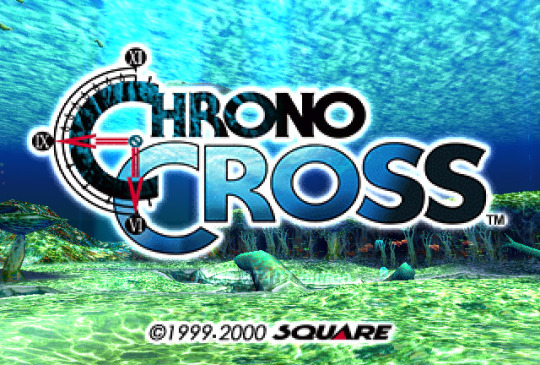
Original Release Date: November 18, 1999 (JPN)
Original Hardware: Sony PlayStation
Chrono Cross is a game that just about every fan of JRPGs has an opinion on. Put in the unenviable position of having to follow up on what many consider to be the best game of all-time in the genre, Chrono Cross chose to take one of the most difficult routes possible. It is undeniably a continuation of the events of the first game, with its main plot serving to tie up one of the loose ends from Chrono Trigger. At the same time, it doesn't seem to be bound by that game at all. At times, it even appears to treat it with contempt. I want to say that Chrono Cross would have been better off as a stand-alone game, but I'm not sure it could have drawn out the same level of emotion from players had it gone that way. Chrono Cross was praised to an almost ridiculous degree when it first launched, but the backlash on it in the years that followed was one of the biggest I've seen in my whole time in the hobby. What's the deal?
Chrono Trigger released with a bang in 1995, riding on the back of a dream team of talents including Final Fantasy creator Hironobu Sakaguchi, Dragon Quest creator Yuji Horii, and famed Dragon Ball artist Akira Toriyama. Its excellent graphics, progressive mechanics, and compelling time travel hook made it an instant winner. Even with more than 20 years down the road, the game is considered to be one of the finest JRPGs and Super NES games. Some would even put it on their short list of the best games of all time. I have friends who make a yearly playthrough of the game a priority, squeezing the game's finite contents for every last drop of enjoyment possible. It's been ported to multiple platforms including the Sony PlayStation, the Nintendo DS, and iOS.
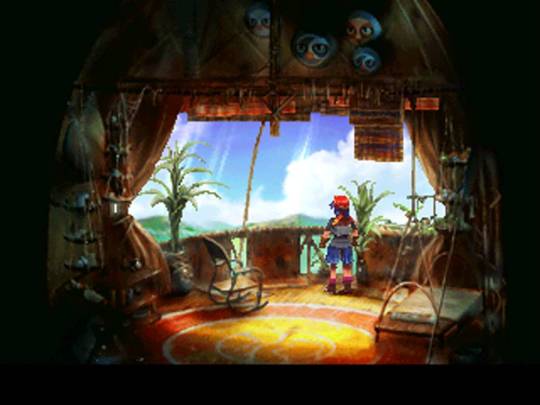
Its sequel would face different circumstances. That dream team had moved on to other things, leaving the less flashy staff members who had shouldered a fair portion of the load of the first game, albeit behind the scenes. The director's chair was occupied by Masato Kato, a well-known game writer who helped pen the stories for Chrono Trigger, Final Fantasy 7, and Xenogears. This was only his third turn as a director, with previous credits on Ninja Gaiden 3: The Ancient Ship of Doom and the Japan-only Satellaview visual novel Radical Dreamers. Perhaps notably, Chrono Cross is also the last game he directed. Naturally, he also provided the story for the game. The game was produced by Hiromichi Tanaka, who would soon take point on Final Fantasy 11. The character designs were provided by Nobuteru Yuki, best known for his work on the anime series Escaflowne.
Considerable talent, to be sure, but the change in directors, designers, artists, and producer made for a game that looked and played almost entirely differently from its predecessor. Besides Kato, the one big returning name was composer Yasunori Mitsuda, the man who had worked himself sick in his composing debut on the first game. Having put a few more games under his belt, Mitsuda was ready and able to deliver a stunning soundtrack that I still think is one of the greatest of all-time. While Chrono Cross had a whole new look and a more confident sound, it was still a great-looking game with some very progressive ideas of its own. One box that would remain unchecked, however, was the time travel motif. There is a little bit of time travel in the story, but you're not the one doing it. Instead, Chrono Cross focuses on crossing between parallel worlds. It's an interesting concept that plays well to Kato's strengths as a writer.
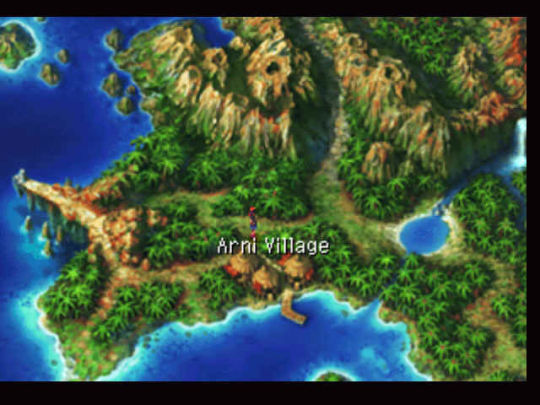
Interestingly, Chrono Cross was the third kick at the can for a sequel to Chrono Trigger. The first, Radical Dreamers, covers part of the same narrative ground. Released only in Japan and exclusively through the Satellaview download service for the Super Famicom, Radical Dreamers introduces some characters that would reappear in slightly altered forms in Chrono Cross, along with a short scenario that would also show up in the latter game. This was only ever meant as a side project, largely existing simply because Kato was annoyed by the loose ends the plot of Chrono Trigger had left. The next potential candidate was the game that would become Xenogears. Initially pitched as an idea for Final Fantasy 7 before another idea won out, it then was planned as a follow-up to Chrono Trigger. After a lot of disagreements, it ended up being its own thing, though it's not hard to spot the connections between it and Chrono Cross.
It was after Xenogears wrapped that Square officially put together a team to create a new Chrono game. The creative talents involved have given some conflicting reasons for the game's dramatic departure from the original game, but the gist seems to be that they didn't feel like rehashing things. They felt doing time travel again would be a cop-out, that a new cast would appeal to potential new players, and that it was important to take full advantage of the new hardware they were working with. As both Tanaka and Kato have strongly asserted, the game's title is not Chrono Trigger 2, so fans probably should not have expected a direct sequel. That kind of feels like a post-hoc excuse to me, but it is what it is.
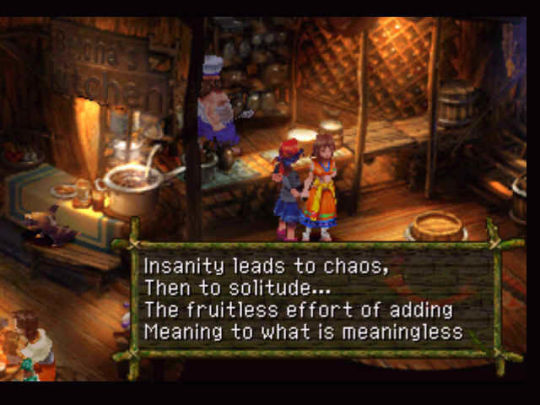
The game released in late 1999 in Japan, but its overseas release would end up coming in August of 2000, not too far ahead of the PlayStation 2 launch. As a highly-anticipated sequel and the culmination of the Summer of Adventure marketing campaign, Chrono Cross came out of the gates like a rocket. The reviews from critics were nearly unanimous in praising the game, with some publications breaking the safety glass on their rarely-used perfect scores to really underline the point. I distinctly recall a major backlash towards American magazine Electronic Gaming Monthly because one of their three reviewers dared to give the game a score of 9.5 out of 10 instead of a perfect score. Given the many shared circumstances between Chrono Cross and Legend of Mana, it's interesting how different the initial reception to each was. But for however much Chrono Cross diverged from Chrono Trigger, it was still quite recognizable in broad strokes. I think that's what saved it from the more immediate negative response its stablemate received.
That said, the negative response did eventually come. It felt like the bigger a fan a person was of Chrono Trigger, the worse they would eventually see Chrono Cross as. Cross had a different, less optimistic tone to it. Rather than focusing on a handful of characters, it chose to spread the love across a huge cast, hoping to fully sell both its world and its high concept. The story broke one of those unwritten rules of fiction. If you give the audience a "happily ever after" ending, revoke it at your own peril. That's just what Chrono Cross did, and it didn't even make a particularly big deal about it. Chrono and Marle died off-screen a long time ago in some random attack from the Porre Army. Lucca's death is an important plot point, but it also happens before the events of the game. Robo at least gets a significant end, but he too does not survive. Ayla, Frog, and Magus don't even appear in the game, with the latter's absence being particularly preposterous as this entire game orbits around his sister, Schala.
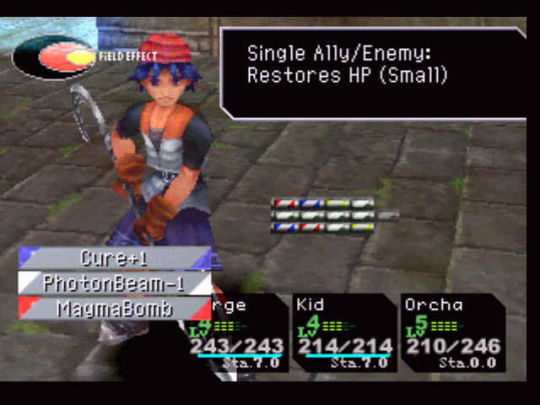
Just in case you think you can delude yourself into thinking the main three aren't really dead, their ghosts actually appear a few times during the course of the game. In short, it was all for naught. Nobody from the main cast of Chrono Trigger got a happy ending, as far as anyone can tell. Heck, you didn't even really save the world. This didn't sit well with many players. Others were put off by the lack of time travel, perhaps expecting there would be some instances later in the game. Even those who could get around these attachments to the plot and characters of the first game were faced with an experience that was almost antithetical to Chrono Trigger.
That game was a fairly light, fast-paced, moderately linear game that wore its messages on its sleeves. Chrono Cross, by comparison, is kind of depressed with existence. The pace is slower, the tone is darker, and the messages are muddier. Although the finished game was heavily pared down from the original plan, it probably could have done with a few more editing passes. For every really interesting, thought-provoking point in the game, there are at least two bits that don't seem to have much purpose at all. Maybe that's intended, though.
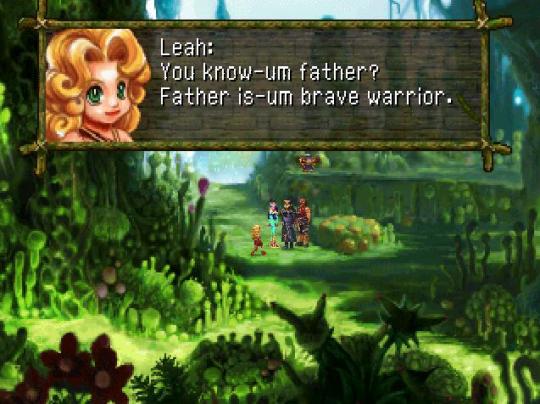
Cross serves as a fascinating counter-point to Trigger in some ways, however. In the latter, your intervention is, as usual for the genre, undoubtedly a good thing. Apart from the early set-up where Marle almost writes herself out of existence, your time-hopping shenanigans never have a negative effect on things, at least as far as you can see. Your presence makes the world a better place, even though you are breaking virtually every fundamental law of nature in doing so. The game ends without addressing this particular karmic debt, and that's fine. It doesn't have to. It's not that type of game.
Chrono Cross has something else to say, though. The premise sees your character Serge traveling to a parallel dimension where he was killed at a young age. After 10 years, this other dimension has a ton of differences compared to your home dimension. The kicker is that many of them make for a better world. Some people are worse off, mind you. But the key is that your existence doesn't make things better for everyone. Indeed, Serge not dying has downright ruined some people thanks to that trusty old Butterfly Effect. One of the more enjoyable aspects of the game is in seeing how people's lives are going in each dimension. At any rate, Serge's death is a good thing for some people. A fact that becomes all the more painful when you discover that Serge was really meant to die. His continued existence comes through unnatural means, and even poses something of a threat to the world order.
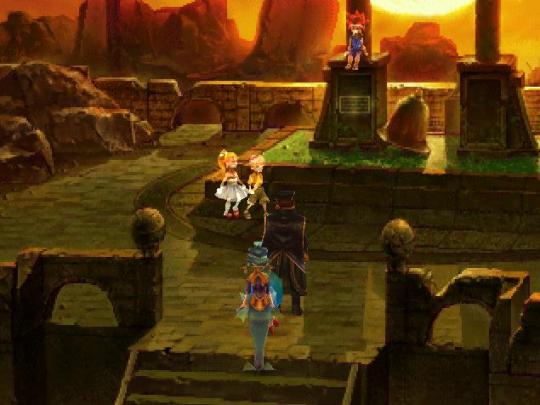
This isn't just told to the player, either. There are a number of situations in the game where you have the option to make an active choice versus just passively letting things play out. In some of those cases, your decision to act makes things much worse for everyone, while inaction ends up with the desired result. Like many of Kato's other stories, Chrono Cross eventually ends up being a little bit too on-the-nose with its theme, with a primary antagonist literally named FATE. From a personal point of view, fighting fate is a good thing for Serge. It keeps him alive. But in many ways, it's a purely selfish act of self-preservation. It only accidentally has a good result. Of course, this is all the work of a seriously convoluted plan on the part of Balthasar, the Guru of Time. It seems that pesky old Lavos is still alive and threatens to merge with the missing Schala. Balthasar set all of the events of the game in motion to bring Serge to the point that he could defeat Lavos, preventing it from becoming a Time Devourer and eating all of time and space.
Like the first game, Chrono Cross has multiple endings. The best one involves trying to squeeze out a puzzle-like sequence of special attacks on the final boss, a sequence that you may or may not pick up on from the clues. Should you manage to pull that off, you'll save Schala and be treated to a somewhat bizarre ending where she ponders the meaning of life in the face of evolution and survival of the fittest. It's pretty clearly Kato talking at this point, mind you. Schala concludes that although individual lives may seem to be meaningless if they aren't significant in the evolutionary sense, every being does its part to lead up to those significant examples. Thus, every life is an important part of the chain, so life isn't meaningless after all. Phew, thanks for sorting that one out.
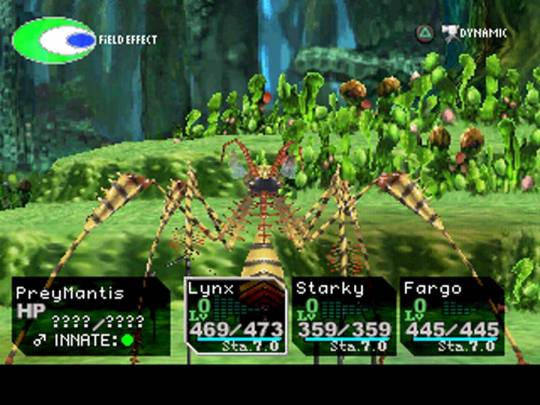
She then signs her letter off in Kid's distinct Australian accent, indicating that her memories have been combined with those of her clone. She promises to find you again someday, sometime. The credits then roll, as a woman who is supposed to be Schala can be seen wandering around various locations in modern-day Japan. It's apparently meant to signal to the player that their very own Kid might be out there somewhere, searching for them. It really only works if you live in Japan, though, since the locations they picked are probably not going to strike a chord with anyone else. To be honest, this is a game full of good ideas and compelling situations, but its main plot ends up collapsing on itself in a way that is highly characteristic of Square games from this era.
This was only my second time playing the game, if you can believe it. I really enjoyed it the first time, but I was definitely high on hype. I wasn't sure how I would end up feeling about it after so many years had passed. I've seen my opinions of Square games I once held sacred turn around in big ways before, and I worried that this might be one of them. At the beginning of the game, as I was enjoying the music, brightly-colored sights, and interesting set-up, I felt that I had perhaps underestimated Chrono Cross. The further in I played, however, the more it started coming back down to Earth. There are too many inconsequential characters, the storyline loses its coherence partway through, and the battle system takes a little too long to sort through in basic skirmishes. This is also a game that virtually demands a guide, and even with one, you're not able to see everything in one playthrough. That's fine, but I don't know that I really want to play this again for a long while. Even the first time, when I was absolutely in love with it, I moved on to other things after getting the best ending.
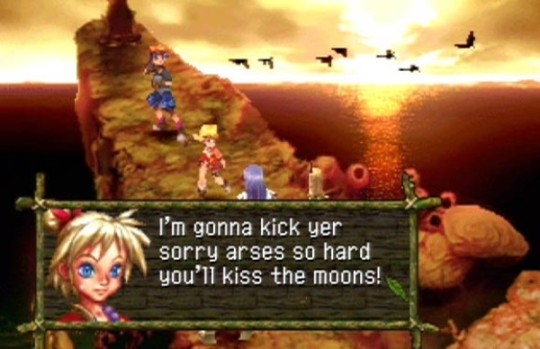
Being a little older and more experienced, I can certainly appreciate some of the ideas the development team tried to apply to the mechanics. That final boss "puzzle" is pretty bad, but in most other respects, I think the element system that governs skills and item use is quite clever. It's a little too restrictive early on, but I like the idea of forcing players to choose carefully what they want in their toolbox. It's a good idea to have a diverse set of skills ready, but if you want to take advantage of field effects, you have to stack certain elements. You might also want to set up a custom set of elements for individual bosses in order to exploit their weaknesses. The only real down point is that this involves a lot of micromanagement that quickly becomes tiresome and isn't totally necessary. I suspect most players will just roll with a general load-out of elements and only change out individual pieces now and then.
I'm always interested in how games try to circumvent grinding. It's been an issue virtually since the inception of the RPG genre, and it's honestly debatable as to whether it's something that needs to be addressed. If players like it, why not give them the option? I guess the problem is that while grinding is often the path of least resistance, it's not fun for everyone. Since it's the most mindless thing to do, people will opt to do it in lieu of trying to reconsider their strategies, even if they don't enjoy it. That leads to people coming away with a poor impression of a battle system that probably would have thrilled them if they had played it without grinding. I think the Japanese focus on intricate combat systems naturally results in designers trying to crack this particular nut.
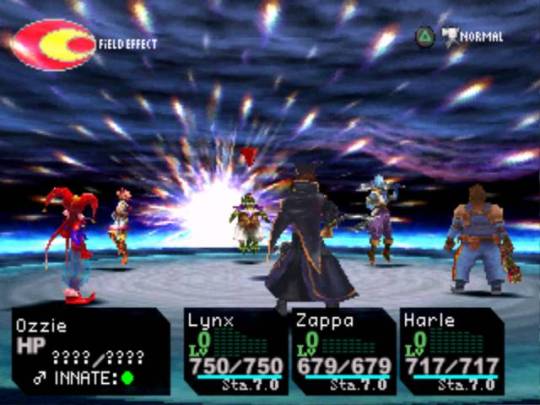
Chrono Cross's approach is to put in hard gates on growth that are connected to your progress in the story. You're given a star ranking that determines how far your party members can grow. Your stats will only see so many gains until you earn a new star by clearing a story boss of some sort. There are other incentives to battling enemies, such as giving you drops that you can use to create new equipment, but you can't simply grind your way past a tough boss. You have to plan your way through it. Luckily, one of the other unique quirks of Chrono Cross assists with that. You can run from any encounter, up to and including the final boss. No, it doesn't make sense from a narrative standpoint, but it makes this one of the fairer RPGs around. Go in, see what elements will serve you best, and if you don't have them, escape.
I think it's that desire to pick away at the accepted standards of the genre that ties the game to its predecessor more than anything. Unfortunately, that's the least likely thing to be appreciated by fans looking for more of the thing they liked before. On top of that, the desire to push the genre in new directions doesn't always work out the way a game's creators might hope for. I don't think anything in Chrono Cross went spectacularly badly, but not many of its innovations proved to be influential. That goes hand-in-hand with its weaker reputation compared to that of Chrono Trigger.
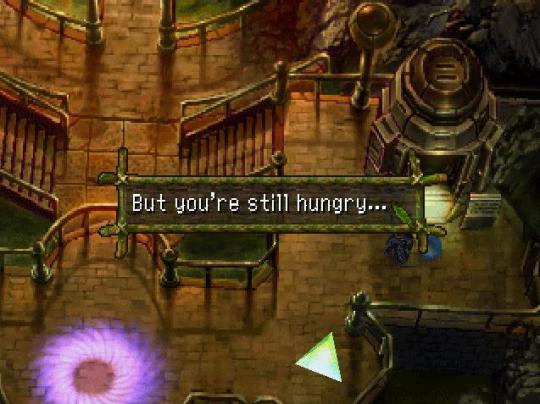
While Chrono Cross isn't entirely forgotten, it does seem like the series as a whole is finished. Chrono Trigger probably has a lot of re-releases in its future, but I'm less confident that Chrono Cross will show up again as anything other than a PSN download. Even Kato's attempt to tie the two games together more strongly in the Nintendo DS port of Chrono Trigger failed to re-ignite interest in Cross. I suppose that speaks to the difficult balancing act that sequels have to pull off. If a game rehashes too much, it will never escape the shadows of those that came before it. On the other hand, if the developer either fails to or chooses not to recognize the qualities that fans appreciated in the original game, history can be swift with the write-off there, too.
It's often the case that when I replay a game, I come away with greater clarity concerning my feelings about it. But even after making my way through Chrono Cross again, I find it hard to nail the game down. I kind of love it. I also kind of hate it. I wish they had cut the fat off it as much as they had with Chrono Trigger. Some of the themes it brings up are brilliant, but others seem like so much belly-button fluff. I think it's a more interesting, more challenging game than Chrono Trigger tried to be. That it failed in many of its ambitions doesn't affect the respect I have for that particular approach. Some small part of me, however, would have been far happier with a safe sequel in this case.
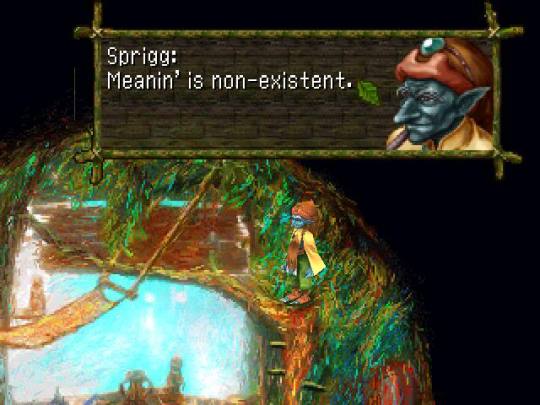
Previous: Threads of Fate
If you enjoyed reading this article and can’t wait to get more, consider subscribing to the Post Game Content Patreon. Just $1/month gets you early access to articles like this one, along with my undying thanks.
1 note
·
View note